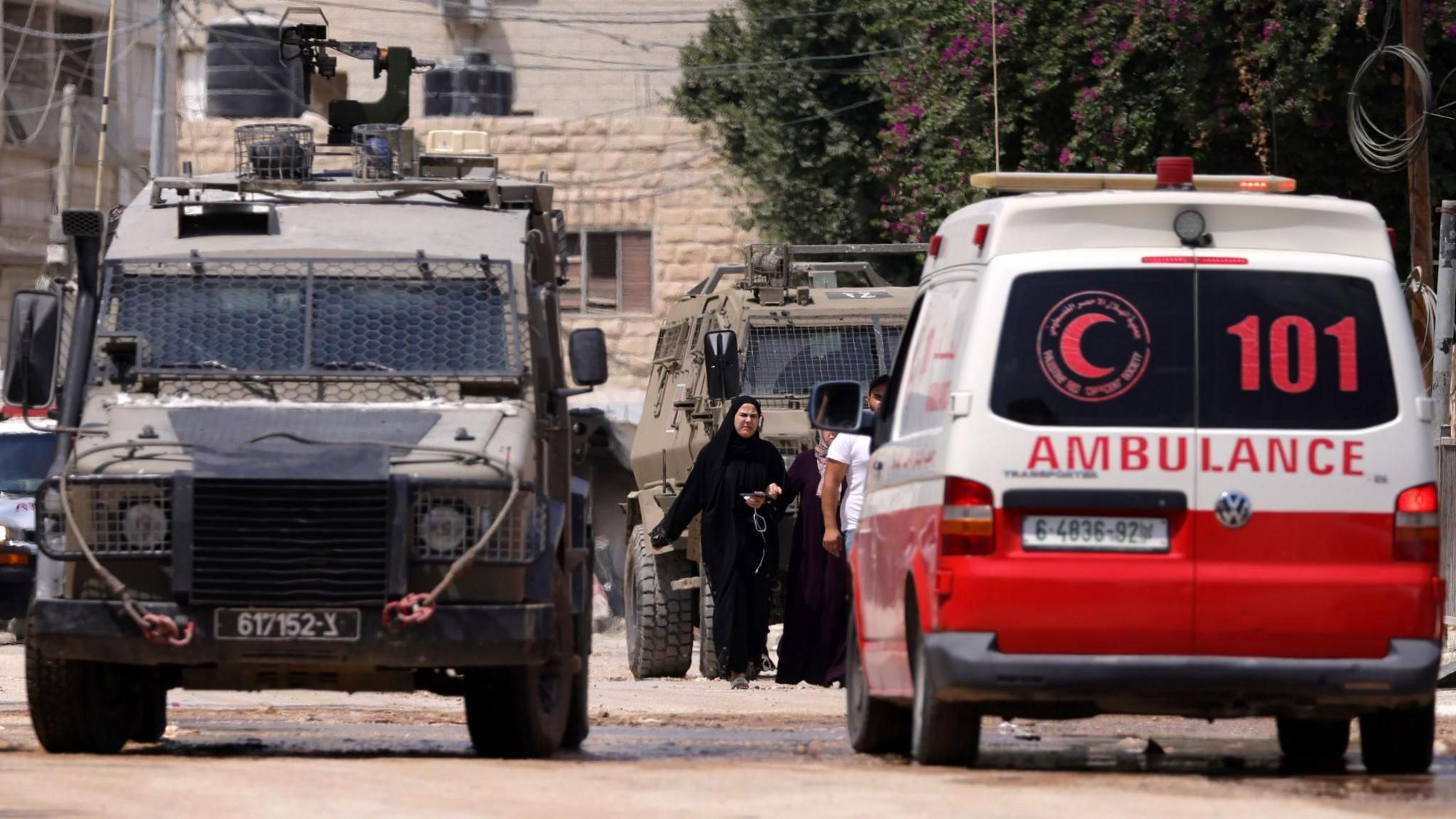Inside the sealed-off Jenin refugee camp targeted by IDF
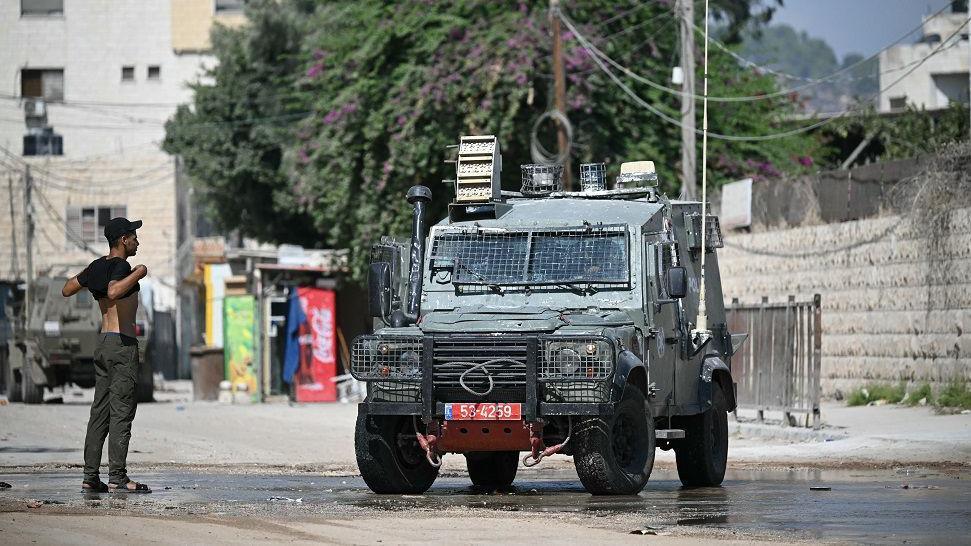
A Palestinian man lifts his T-shirt to show Israeli troops he is unarmed, during a military operation in Jenin
- Published
The messages come through on the Israeli phone network - scraps of information from inside Jenin’s refugee camp.
"I don’t dare go on the roof, in case I’m shot," one resident says, speaking anonymously.
Information inside the camp is scarce, he says, and the streets are empty, as residents stay inside.
"It’s mostly old people and children here," he tells me. "The young people left before the army arrived – it’s bad luck for those who can’t get out."
Jenin, the focus of news networks today, has been living through a news blackout.
The Palestinian phone network was down for much of the day - lines cut by the Israeli military operation here, the telecoms company said.
The resident I speak to says his family still has water and electricity, and that a small shop nearby was open and selling supplies, under the constant buzz of military drones.
As we talk, a few scattered gunshots reverberate over the rooftops from the direction of the camp.
"Yes, I heard them too," he says. "The sound of the drones has increased."
As he is speaking, an armoured bulldozer rumbles towards one of the camp’s main entrances, the road deserted and baking in the afternoon sun.
For a few hours last night, explosions and gunfire erupted from the alleyways there, disrupting sleep.
But since then, this man says it had been largely quiet - with no sign of house-to-house searches in his neighbourhood, nor of fighters from the camp.
"It’s abnormally quiet," he said.
The camp has been sealed off by the army since it arrived before dawn on Wednesday - part of a wide, coordinated operation across several centres of the occupied West Bank.
Jenin camp is a base for armed Palestinian fighters, but also unarmed civilians. There have been fierce gun battles here in recent months, as Israeli forces have raided, again and again, looking for them.
Army vehicles are also stationed around two of Jenin’s main hospitals.
Ambulances are stopped as they approach - approaching and reversing in response to terse instructions broadcast in Arabic from loudspeakers on the army Jeeps.
We watched paramedics get out to open the back doors of their ambulance, to show what - or who - was inside. Two female patients were also made to get out and present themselves to soldiers in the Jeeps.
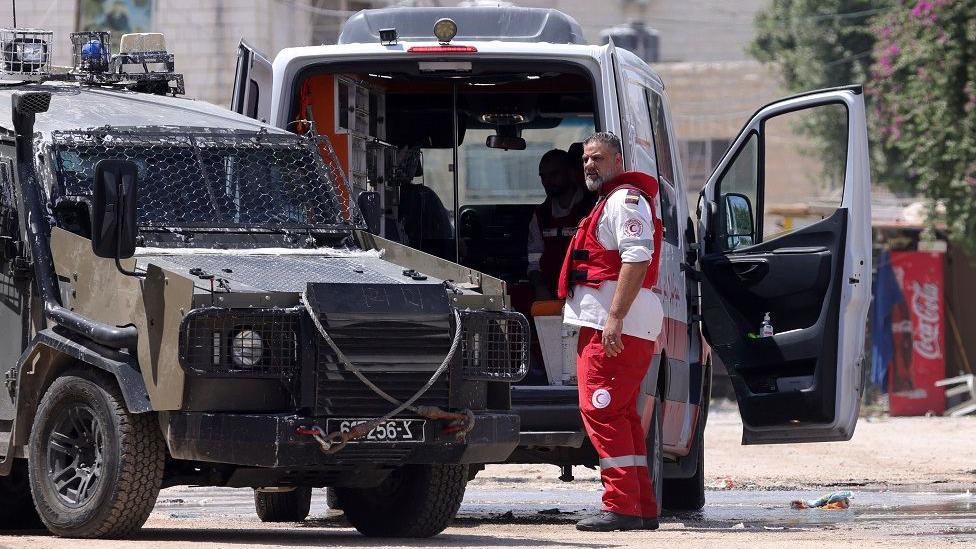
The Israeli army seen searching an ambulance outside a hospital in Jenin on Thursday
Behind them, one of Jenin’s main commercial districts is shuttered and deserted. Cardboard boxes are scattered across the empty road; fruit sits abandoned on carts under thin cotton covers - the sickly-sweet smell of rotting mangoes fills the silent street.
One small grocery shop has been opening in the afternoon – an urban oasis for those who can reach it.
Thaeer Shana’at is stocking up on food to deliver to local families in the eastern neighbourhood, where Israeli forces were blocking access, he says.
"The whole of the eastern area - a population of about 20,000 - is sealed off," he said.
"Only ambulances can deliver food. If we go there, we get fired at. There are many areas where we can’t deliver people any food or drink."
He says his wife and baby are still in Jenin camp, as he couldn’t get them out before the army arrived.
"They are scared to open the door," he says. "A sniper is directly stationed in front of the house."
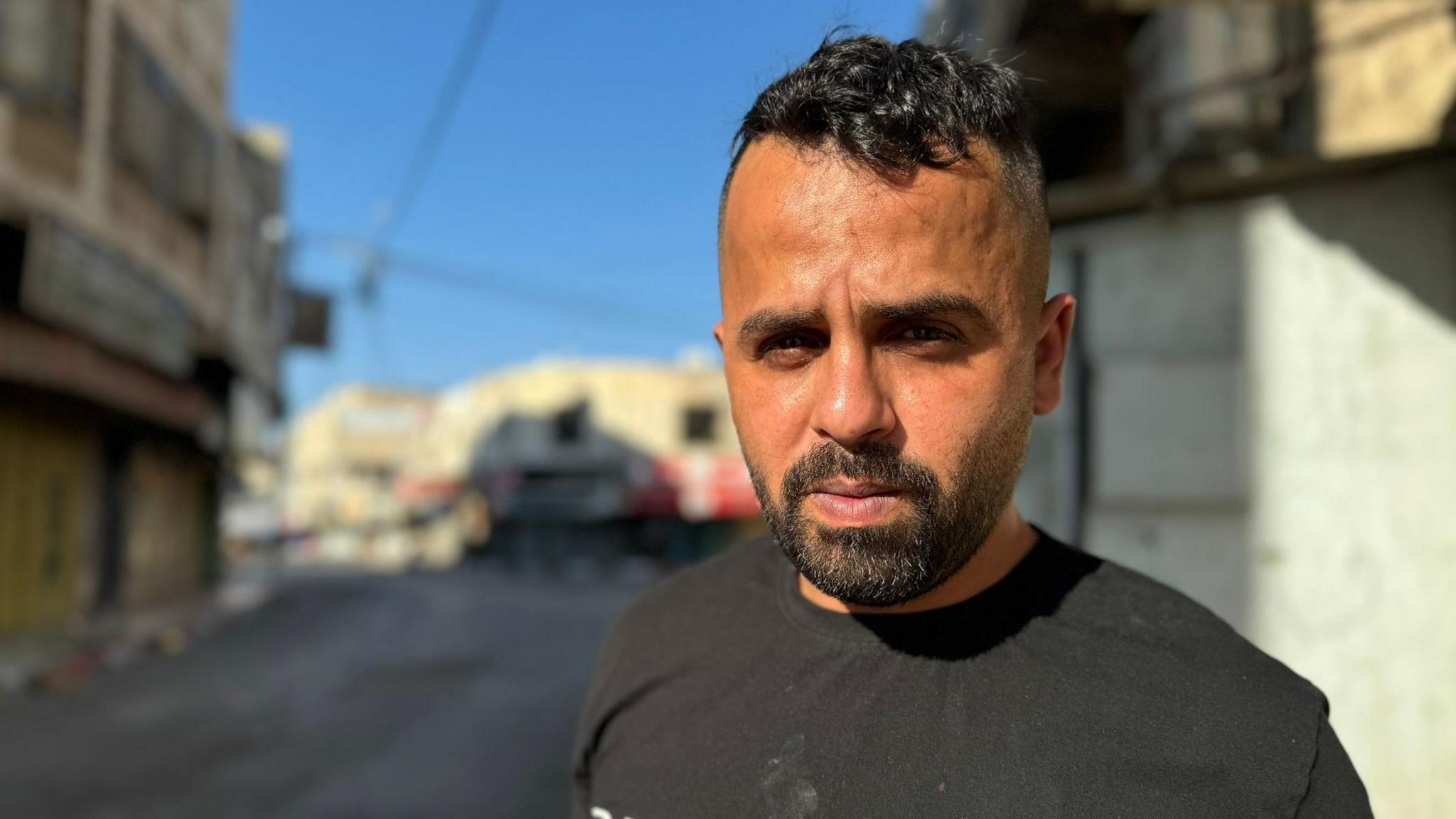
Thaeer Shana’at is worried for his wife and child, who are still in the camp
Munir Garwan, who used to work for the municipality, is also waiting to buy food.
He says he was a member of the West Bank’s main political party, Fatah, and had spent six years in an Israeli jail for shooting at the army, and belonging to a "hostile organisation".
"The occupation [Israel] claims it is trying to stop terrorism. But when the young men get killed, new ones take their place. They are getting nowhere like that."
"We are not fighting to make someone victorious over the other," he said. "We are fighting for our rights."
As night fell, loud explosions and gunfire were heard again from the direction of the camp.
Information has begun to flow again, as communication networks begin to return, circulating details of the ongoing incursion, and the identities of those injured and killed.
The news blackout in Jenin is ending, but the news is the last thing people here want to hear.
- Published29 August 2024
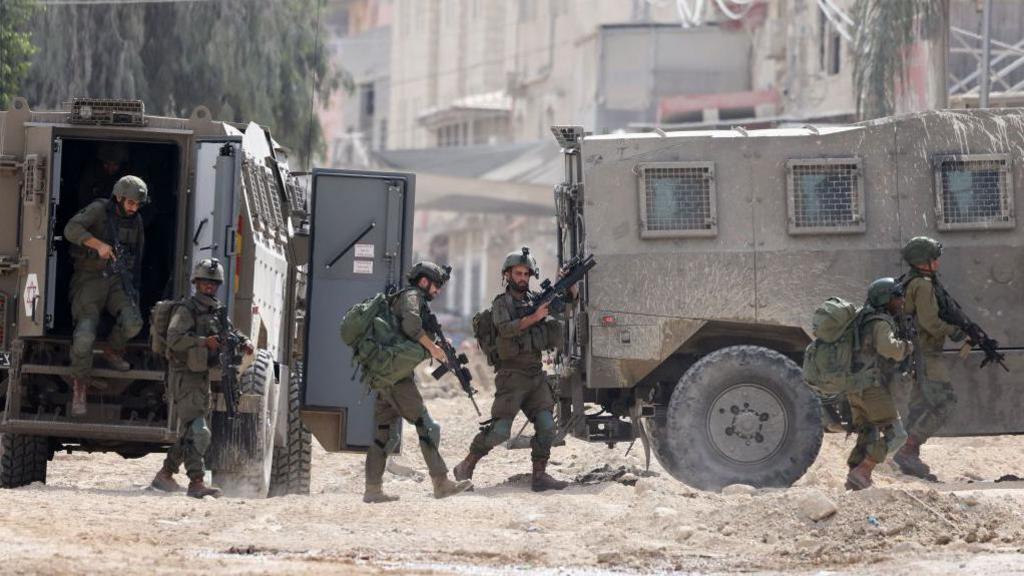
- Published27 August 2024
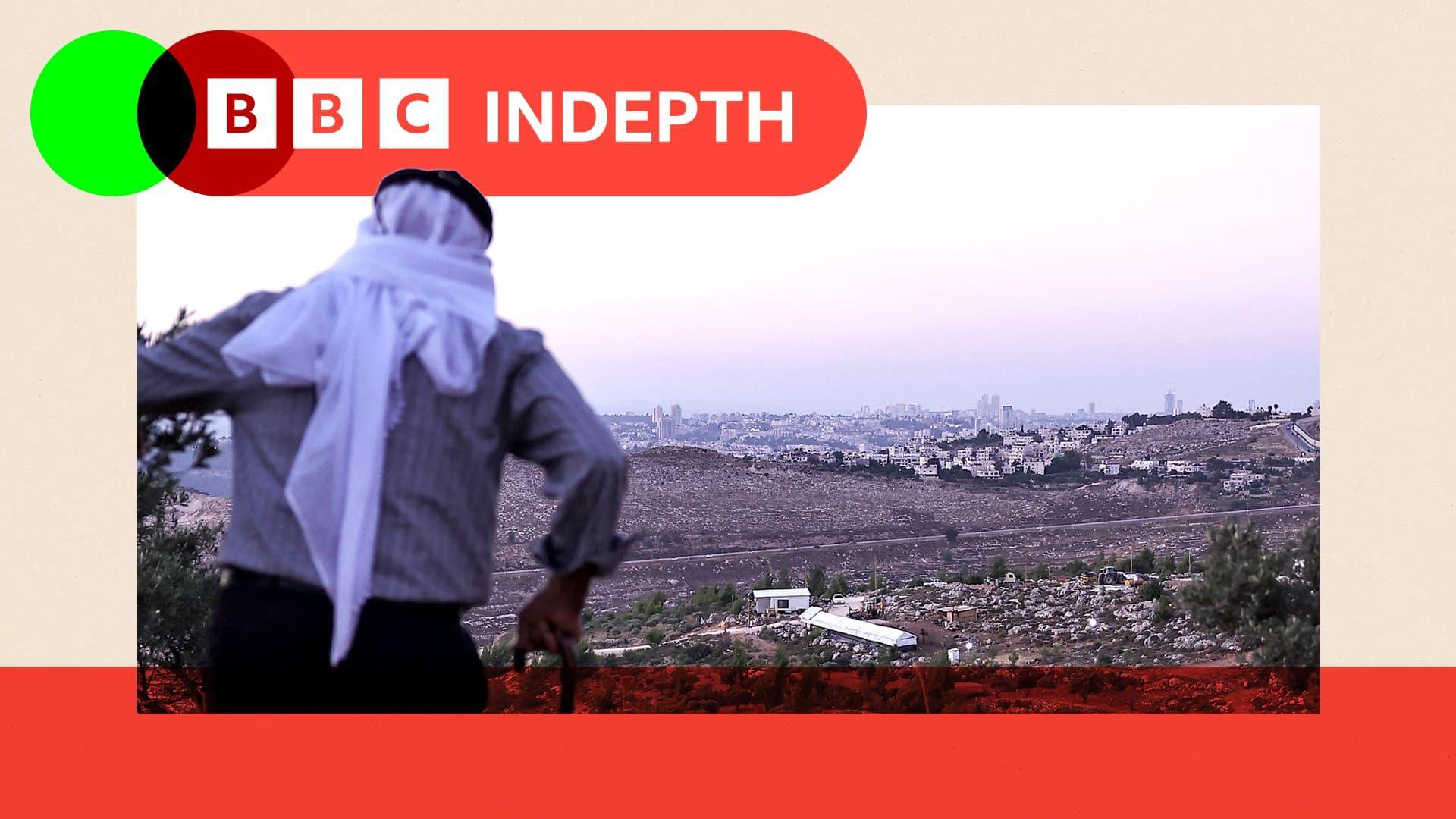
- Published28 August 2024
